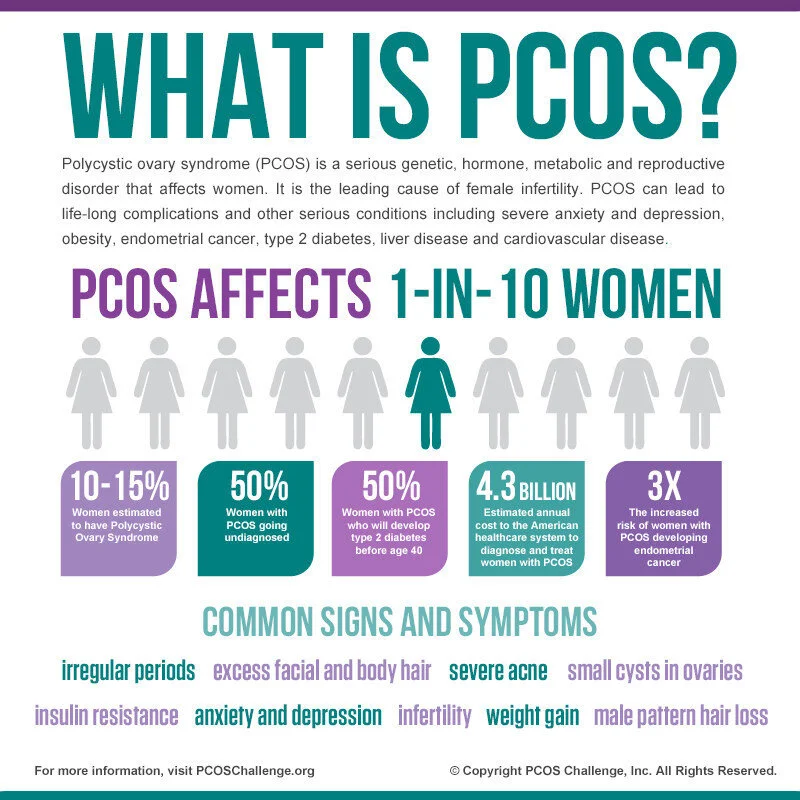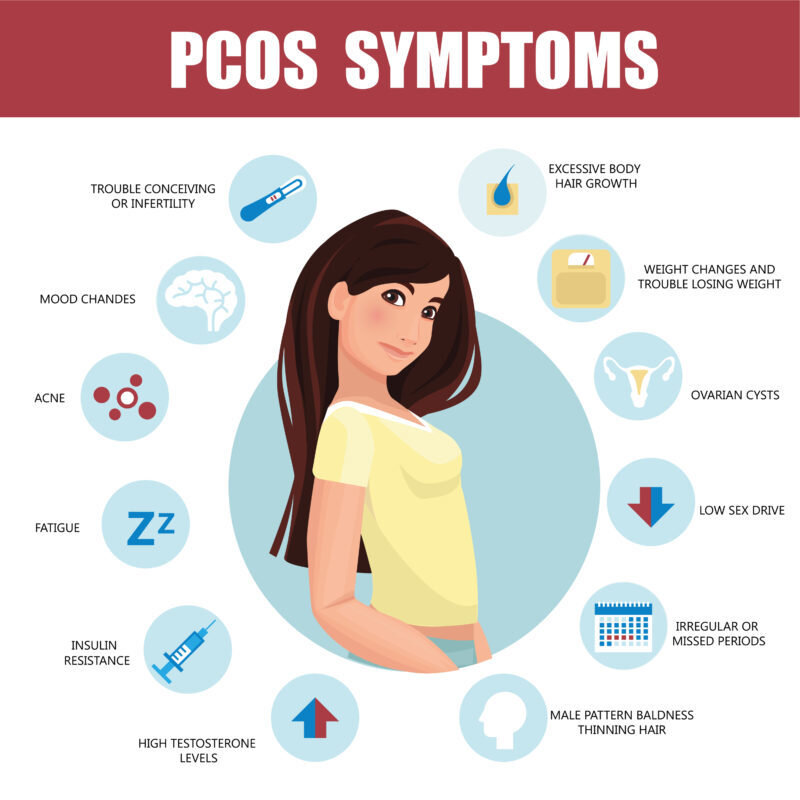PCOS - Polycystic Ovary Syndrome
What is polycystic ovary syndrome (PCOS)?
Polycystic ovary syndrome (or polycystic ovarian syndrome – PCOS) is a complex hormonal condition. ‘Polycystic’ literally translates as ‘many cysts’. This really refers to there being many partially formed follicles on the ovaries, which each contain an egg. These rarely grow to maturity or produce eggs that can be fertilised.
Women with PCOS commonly have high levels of insulin, or male hormones known as 'androgens', or both. The cause of this is unclear, but insulin resistance is thought to be the key problem driving this syndrome.
In some women, PCOS runs in the family, whereas for others, the condition only occurs when they are overweight.
PCOS is relatively common, especially in infertile women. It affects 12 to 18 per cent of women of reproductive age (between late adolescence and menopause). Almost 70 per cent of these cases remain undiagnosed.
Up to a third of women may have polycystic ovaries seen on an ultrasound, but they do not all have PCOS. To be diagnosed with PCOS, women need to have polycystic ovaries or the typical symptoms described below.
Symptoms of PCOS
Women who have PCOS may experience:
irregular menstrual cycles – menstruation may be less or more frequent due to less frequent ovulation (release of an egg)
amenorrhoea (no periods) – some women with PCOS do not menstruate, in some cases for many years
excessive facial or body hair growth (or both)
acne
scalp hair loss
reduced fertility (difficulty in becoming pregnant) – related to less frequent or absent ovulation
mood changes – including anxiety and depression
obesity
sleep apnoea.
You don’t have to have all of these symptoms to have PCOS.
Treatment of PCOS
It is important that all the symptoms of PCOS are addressed and managed long-term, to avoid associated health problems. PCOS is a long-term condition and long-term management is needed.
Depending on the symptoms you experience, management of PCOS can include:
lifestyle modifications – increasing your physical activity levels and eating a healthy diet can both help to manage PCOS
weight reduction – research has shown that even five to 10 per cent weight loss can provide significant health benefits
medical treatment – with hormones or medications.
Lifestyle modifications
Lifestyle changes – such as eating a healthy, balanced diet and introducing regular physical activity into your weekly routine – can have a positive effect on your health in so many ways. For women who have PCOS, a healthy lifestyle can lead to an improvement in symptoms, particularly if you are overweight and your new lifestyle helps you to lose weight.
Weight reduction
You don’t even have to lose much weight to feel the benefit. Studies suggest that just five to 10 per cent weight loss can:
restore normal hormone production – which can help regulate periods and improve fertility
improve mood
reduce symptoms such as:
facial and body hair growth
scalp hair loss
acne.
It can also reduce your risk of developing type 2 diabetes and cardiovascular disease.
Medical treatments for PCOS
Medical treatments for PCOS treatments include:
the oral contraceptive pill – if you are suffering from irregular, heavy periods, the oral contraceptive pill is often prescribed for contraception, to regulate the cycle, reduce excess hair growth and acne, and prevent the lining of the womb from thickening excessively
medication to block hormones such as testosterone (for example, spironolactone) – these may be used to reduce excess hair growth or scalp hair loss
infertility medications – if infertility is a problem, clomiphene citrate (sold as Clomid) may be taken orally to bring about ovulation (egg production)
psychological counselling.
Your GP and specialists can advise you about what treatment best suits you.
Your PCOS management team
A multidisciplinary approach is the best way to manage and treat PCOS. A health care team to help manage PCOS may include:
your GP
an endocrinologist (hormone specialist)
a gynaecologist (for fertility issues)
a dietitian
an exercise physiologist or physiotherapist
a psychologist.
Long-term health risks of PCOS
PCOS is associated with the following long-term health risks:
insulin resistance
increased risk of the development of diabetes, especially if women are overweight
cholesterol and blood fat abnormalities
cardiovascular disease (heart disease, heart attack and stroke)
endometrial cancer.
Diagnosis of PCOS
Diagnosis of PCOS is likely to involve:
your medical history
an examination, which may include an ultrasound
tests to measure hormone levels in the blood.
Early diagnosis is important as it can allow symptoms to be managed and may prevent the development of long-term health problems such as diabetes.
Where to get help
Your GP
Gynaecologist
Endocrinologist
Local women's health clinic
Community health centre
Jean Hailes for Women’s Health 1800 JEAN HAILES (532 642)
Dietitian
Exercise physiologist



